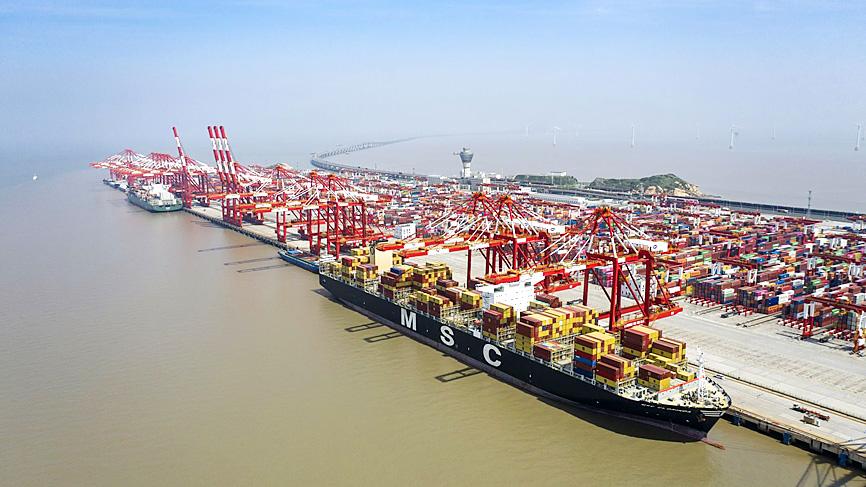Senior US and Chinese officials yesterday discussed US economic sanctions and tariffs amid reports that US President Joe Biden’s administration is close to rolling back some of the trade levies imposed by former US president Donald Trump.
The lifting of tariffs and sanctions and the fair treatment of Chinese enterprises are areas of concern to China, Chinese Vice Premier Liu He (劉鶴) told US Secretary of the Treasury Janet Yellen in a video call yesterday morning, according to a statement from the Chinese Ministry of Commerce.
According to Beijing, the two sides discussed economic policy and stabilizing global supply chains, agreeing that it is significant for the US and China to strengthen communication and coordination in those areas for the benefit of both countries and the rest of the world.

Photo: Bloomberg
The talks were pragmatic and constructive, it said.
The US called the talks “candid and substantive,” but the official readout of the meeting did not mention tariffs or sanctions.
However, it did say that Yellen “frankly raised issues of concern including the impact of Russia’s war against Ukraine on the global economy and unfair, non-market” economic practices by China.
The call came after reports that Biden might announce a rollback of some US tariffs on hundreds of billions of dollars of Chinese goods as soon as this week.
As inflation increases in the US, expectations are rising that the administration would ease some of the taxes to help lower the costs of everyday merchandise.
However, senior members of the administration appear divided over the need to lift tariffs.
Yellen last month said the Biden administration wanted to reconfigure the tariffs, which “really weren’t designed to serve our strategic interests.”
That is a contrast with US Trade Representative Katherine Tai (戴琪), who has called the levies “leverage” against China and questioned how much effect removing them would have on inflation.
Analysts say scrapping the tariffs would have only a marginal effect on US inflation and China’s trade, with a possible recession in the world’s largest economy a bigger threat to China’s outlook.
“The tariffs’ negative impact on Chinese exports has been limited and so a reduction in them won’t have too big an impact either,” said Larry Hu (胡偉俊), head of China economic analysis at Macquarie Group Ltd. “The impact on US inflation would be limited too -- prices in the US didn’t surge, for example, in 2019 when tariffs were in place.”
“The more concerning thing for exports in the short term is a potential US recession,” he said.
“With or without the tariffs, China’s export growth will slow down anyway,” he added.
Barclays PLC estimated that if there was a complete rollback of tariffs, the maximum direct effect on US inflation is a one-time reduction of 0.3 percentage points.
The tariffs have not achieved the intended goal of slowing down Chinese exports and rebalancing the trade relationship with the US. While China’s economy has been undermined by COVID-related shutdowns this year, exports to the US in the first five months of this year still grew 15.1 percent from a year earlier, after jumping almost 28 percent last year and 8 percent in 2020.
Imports increased 4 percent so far this year, official data showed, putting the bilateral trade balance on track for another record year.

The US dollar was trading at NT$29.7 at 10am today on the Taipei Foreign Exchange, as the New Taiwan dollar gained NT$1.364 from the previous close last week. The NT dollar continued to rise today, after surging 3.07 percent on Friday. After opening at NT$30.91, the NT dollar gained more than NT$1 in just 15 minutes, briefly passing the NT$30 mark. Before the US Department of the Treasury's semi-annual currency report came out, expectations that the NT dollar would keep rising were already building. The NT dollar on Friday closed at NT$31.064, up by NT$0.953 — a 3.07 percent single-day gain. Today,

‘SHORT TERM’: The local currency would likely remain strong in the near term, driven by anticipated US trade pressure, capital inflows and expectations of a US Fed rate cut The US dollar is expected to fall below NT$30 in the near term, as traders anticipate increased pressure from Washington for Taiwan to allow the New Taiwan dollar to appreciate, Cathay United Bank (國泰世華銀行) chief economist Lin Chi-chao (林啟超) said. Following a sharp drop in the greenback against the NT dollar on Friday, Lin told the Central News Agency that the local currency is likely to remain strong in the short term, driven in part by market psychology surrounding anticipated US policy pressure. On Friday, the US dollar fell NT$0.953, or 3.07 percent, closing at NT$31.064 — its lowest level since Jan.

Hong Kong authorities ramped up sales of the local dollar as the greenback’s slide threatened the foreign-exchange peg. The Hong Kong Monetary Authority (HKMA) sold a record HK$60.5 billion (US$7.8 billion) of the city’s currency, according to an alert sent on its Bloomberg page yesterday in Asia, after it tested the upper end of its trading band. That added to the HK$56.1 billion of sales versus the greenback since Friday. The rapid intervention signals efforts from the city’s authorities to limit the local currency’s moves within its HK$7.75 to HK$7.85 per US dollar trading band. Heavy sales of the local dollar by

The Financial Supervisory Commission (FSC) yesterday met with some of the nation’s largest insurance companies as a skyrocketing New Taiwan dollar piles pressure on their hundreds of billions of dollars in US bond investments. The commission has asked some life insurance firms, among the biggest Asian holders of US debt, to discuss how the rapidly strengthening NT dollar has impacted their operations, people familiar with the matter said. The meeting took place as the NT dollar jumped as much as 5 percent yesterday, its biggest intraday gain in more than three decades. The local currency surged as exporters rushed to